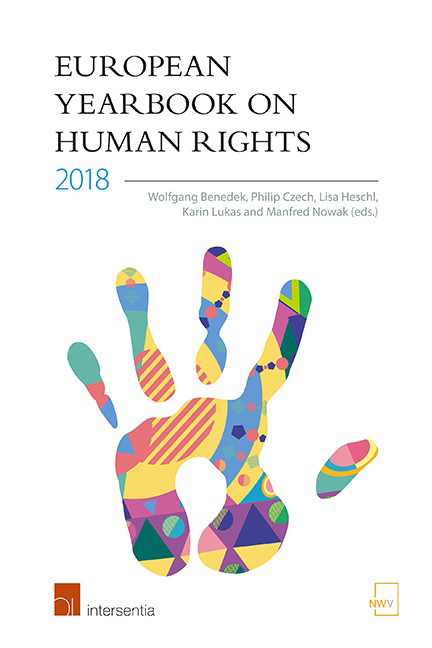Book contents
- Frontmatter
- Scientific Advisory Board
- Editors’ Preface
- Contents
- List of Abbreviations
- List of Contributors
- Part I Topic Of The Year
- Part II Eu
- The Court of Justice of the European Union and Human Rights in 2017
- Understanding Resettlement Through the Prism of Human Rights: A Case Study on the Resettlement in Belgium of Syrian Refugees from Lebanon
- The Decline of Fundamental Rights in CJEU Jurisprudence after the 2015 ‘Refugee Crisis’
- The EU Migration Crisis and the Human Rights Implications of the Externalisation of Border Control
- Does the EU Framework for Roma Integration Promote the Human Rights of Romani Persons in the Union?
- The EU Guidelines on Freedom of Religion or Belief at Their Fifth Anniversary: Implementation Lagging Behind?
- Human Rights Council in Troubled Waters: The EU as a Stabilising Factor
- Part III Coe
- PART IV OSCE
- Part V Others
- Part VI Book Reviews
- Index
The EU Migration Crisis and the Human Rights Implications of the Externalisation of Border Control
from Part II - Eu
Published online by Cambridge University Press: 31 January 2019
- Frontmatter
- Scientific Advisory Board
- Editors’ Preface
- Contents
- List of Abbreviations
- List of Contributors
- Part I Topic Of The Year
- Part II Eu
- The Court of Justice of the European Union and Human Rights in 2017
- Understanding Resettlement Through the Prism of Human Rights: A Case Study on the Resettlement in Belgium of Syrian Refugees from Lebanon
- The Decline of Fundamental Rights in CJEU Jurisprudence after the 2015 ‘Refugee Crisis’
- The EU Migration Crisis and the Human Rights Implications of the Externalisation of Border Control
- Does the EU Framework for Roma Integration Promote the Human Rights of Romani Persons in the Union?
- The EU Guidelines on Freedom of Religion or Belief at Their Fifth Anniversary: Implementation Lagging Behind?
- Human Rights Council in Troubled Waters: The EU as a Stabilising Factor
- Part III Coe
- PART IV OSCE
- Part V Others
- Part VI Book Reviews
- Index
Summary
ABSTRACT
In the context of the world‘s largest refugee crisis since World War II, the European Union (EU) has to cope with unprecedented numbers of arrivals at its external borders. In light of the weekly shipwrecks and drownings in the Mediterranean, European states decided to develop a common approach to the crisis, as they realised the upcoming months and years would be characterised by massive migration flows to the continent.
This article investigates the EU‘s response to the migration crisis focusing on migration as a policy area, especially with regards to border management and control of the European external borders. It will aim at critically assessing the human rights impact of the policies implemented since 2016, exploring the human rights consequences of the externalisation of the EU‘s migration management. As case studies, it will analyse three specific instruments introduced by the EU since March 2016: the EU-Turkey statement, the creation of the European Border and Coast Guard Agency and the establishment of a closer partnership with Libya.
To overcome the crisis, this research will assert that the EU needs to find a balance between its moral and legal obligations and its duty to ensure the safety of its citizens and the securing of its external borders. It will provide recommendations regarding the need for a genuine holistic approach, one that bridges security and human rights concerns. Extending the understanding of national security with human security approaches could help develop more comprehensive and effective migration management policies.
INTRODUCTION: THE EU MIGRATION CRISIS, A STATE OF PLAY
In the words of Dimitri Avramopoulos, European Commissioner for Migration, Home Affairs and Citizenship, ‘ the world finds itself facing the worst refugee crisis since the Second World War ‘. In recent years, an unprecedented level of human mobility was recorded across the globe. The United Nations High Commissioner for Refugees (UNHCR) asserts that 65.6 million persons were displaced worldwide at the end of 2016, a staggering 22.5 million of whom were refugees. Although the Global South continues to receive the largest share of them – with around 84 % of the world‘s refugees hosted in developing countries – migration flows to the EU have dramatically increased in recent years, with unprecedented numbers of arrivals at the European external borders.
- Type
- Chapter
- Information
- European Yearbook on Human Rights 2018 , pp. 135 - 166Publisher: IntersentiaPrint publication year: 2018



